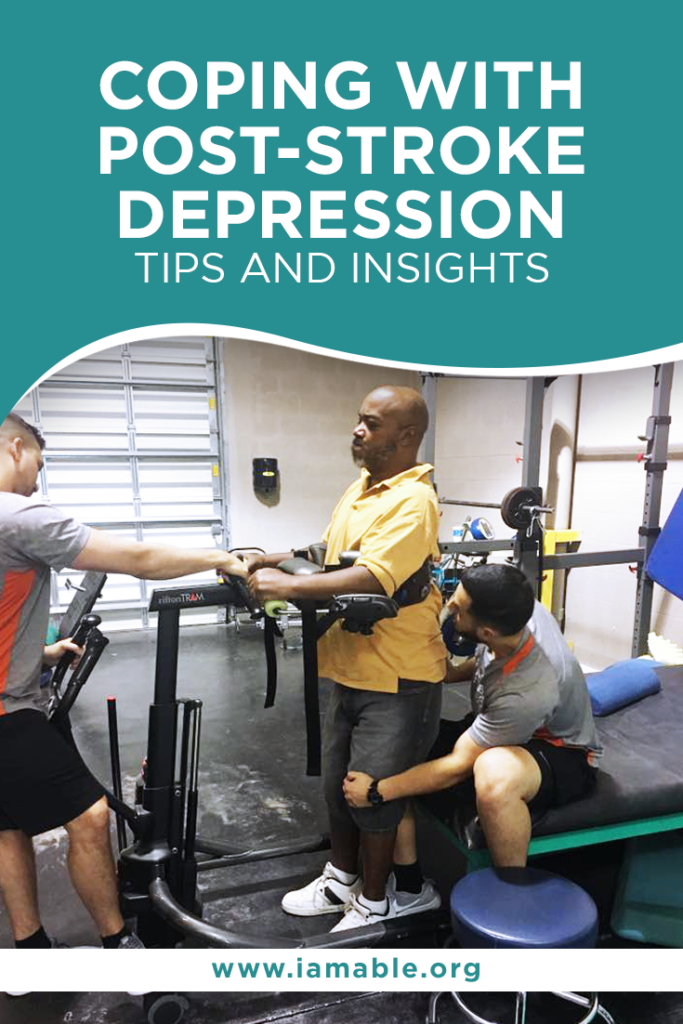Miami, FL 33186

Depression often follows a stroke. That’s why patients need to learn a few tips on dealing with post-stroke depression here at iAM ABLE.
Post-stroke depression is a leading problem we observe among patients seeking activity-based therapy in Miami. Studies explain that it affects one-third of patients who suffer from a stroke. Unfortunately, some cases don’t get diagnosed. Some even get overlooked by patients and their assigned healthcare professionals. If you’re among the many patients who struggle with post-stroke depression, we hope our tips and insights on how to cope can help you improve your recovery phase.
A stroke is a life-changing event in a patient’s life. It can wreak havoc on the body and cause disabilities that can either be temporary or permanent. Some have to accept the fact that they can no longer move half of their body. Others have to deal with mental difficulties, vision loss, or impaired speech and communication. Then, there’s also the matter of dealing with relationships, responsibilities, and finances while living with paralysis and other effects of stroke.
Naturally, even the brightest and most jolly patients can experience difficulty accepting their fate. Stroke survivors might need extra time to adjust and make necessary changes in their life to accommodate their limited capabilities. It is during these times when patients need additional support from their families and friends.
The death rate of stroke survivors has noticeably decreased over the years. However, many surviving patients have to combat major depression as they adjust to their new norm. Some grieve because of loss of mobility and independence. Others, on the one hand, feel frustrated after learning they have speech or communication difficulties.
Notably, many patients overcome this dark and gloomy episode in their post-stroke recovery. But sometimes, others fall into depression for several weeks or months. If left unresolved, this could heavily impact the patient’s life and increase one’s susceptibility to the following:
Here are some usual signs of post-stroke depression that you should look out for:
Depression is a normal part of the recovery process of a stroke survivor. If you suspect having this symptom, we strongly recommend getting professional help so you can have the guidance needed to cope and navigate your way out of post-stroke depression.
You might also find it helpful to try activity-based therapy in Miami or make minor lifestyle adjustments. Here’s a closer look at the most important ways you can manage depression during stroke recovery:
A study notes that maintaining an active lifestyle can help reduce or prevent depressive symptoms among patients with chronic or sub-acute stroke. That’s why it’s crucial to integrate options like activity-based therapy in Miami into your post-stroke recovery journey.
The last thing you would want is to deal with another disease or disorder. However, unfortunately, as a stroke survivor, your risk of getting sick with an additional illness is higher than the average person. A study explains that this happens because stroke impairs the body’s bactericidal immunity. It also weakens the immune system’s function.
So, your best option is to stay healthy by getting enough nutrition and sleep. It would help if you also practiced basic hygiene techniques like constantly sanitizing your things and washing your hands.
It is normal to feel withdrawn from your loved ones during the first few days of recovery. That’s why doctors highly recommend staying socially engaged. Try joining group activities like support groups meeting, book clubs, and exercises classes to interact with people in your community. You can also start small by communicating with the people closest to you.
Yoga, tai chi, and meditation prove effective in reducing mental fatigue and stress. A 2019 study adds that mindfulness exercises could help cope with increased muscle spasticity (abnormal muscle tightness) among chronic stroke survivors. So it might help to add mindfulness exercises to your weekly post-stroke management plan.
When in doubt, don’t hesitate to seek professional medical help. You can get treatment or try counseling to manage your post-stroke depression. You can also combine both approaches and see what option works better for you. The earlier you address the first signs of depression, the better outlook you have.
We hope that our quick guide on post-stroke depression can help you manage your condition better. Also, we hope that you put our tips to good use. As a go-to authority for activity-based therapy in Miami, we at iAM ABLE aim to provide insightful resources to help you transition to your second chance at living a fulfilled life.
Want to learn more about activity-based therapy in Miami and the other things you need to thrive after a paralyzing accident or health problem? You can download our eBook on how to live a fulfilled and happy when you have a paralyzing injury.
Grab our free e-book 7 Unbelievably Important Steps to Take to THRIVE after Paralysis by clicking the image below.
